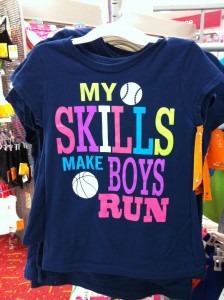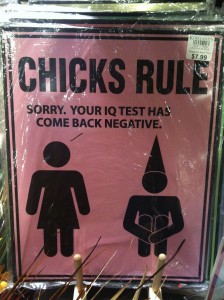
Walking through Target when a t-shirt catches my eye in the girls’ department.
Excuse me?
I’m a proud member of the MOB (Mothers Of Boys). I don’t see a shirt in the boys’ department reading, “My Skills Make Girls Run.” That would never be tolerated. As a grown-up girl, I’d be unhappy if it were.
Then there’s the sign I saw in Kirkland’s.
Where’s the one reading “Boys Rule: Your IQ Test Has Come Back Negative?” Kirkland’s would be boycotted post-haste if that sign ever made it to the shelves.

The battles for women’s suffrage, educational equality, and Title IX were difficult. Necessary. Admirable.
Today women earn only 77 cents per dollar earned by men working the same jobs. Women hold only 17 percent of the seats in Congress. Women are victimized by domestic violence . Poverty rates are highest for families lead by single women. There’s still work to be done.
Is this how we want to do it? By using little girls to demean little boys?
The notion that it’s acceptable to degrade boys isn’t new. I love the old Schoolhouse Rock songs and often feature them in my posts. My seven-year-old son and I can sing the lyrics to nearly all of them.
But there’s a line in Unpack Your Adjectives that makes me want to crawl under the table. My heart breaks as my son laughs along, unaware of the politically-loaded, mean-girl, angry-woman sentiment behind it:
“Girls who are tall can get taller,
Boys who are small can get smaller,
Till one is the tallest
And the other’s the smallest of all.”
This is 2012, not 1950, 1969, 1975 when Unpack Your Adjectives first aired, or Thelma and Louise’s 1991. The vitriol is overkill.
Women pursue education. They earn more advanced college degrees and bachelor’s degrees than men.
Women join the workforce. More than 70 percent of all mothers with children younger than age 18 work outside the home or are looking for work outside the home.
Women hold power in the voting booth. In the 2008 presidential election, about 66 percent of women voted compared to 62 percent of men; that’s 70.4 million women compared to 60.7 million men.
Girls play sports. A 2008 report from the Women’s Sports Foundation found 69 percent of girls participate in organized and team sports. That’s nearly equal with the 75 percent of boys who participate.
Sisters, hear me when I say I’m indebted to you. Now can we please celebrate the partial victories, keep on keeping on, and leave our kids out of the combat?

Think about what we’re communicating to our daughters. What we’re allowing to happen to our sons. Will this attitude ameliorate animosity or deepen it? Solve inequality or perpetuate it?
Teach respect. Work for equality. Rise above the hurt and the hate. Burn the cattiness with all the gusto once used to burn the bras.
My son isn’t responsible for your pain. No amount of discrimination justifies using our children as pawns in an ongoing, grown-up fight.
And He took the children in His arms, placed His hands on them and blessed them. Mark 10:16 NIV
Sweet Child O’ Mine by Sheryl Crow.
This is just my opinion. What do you think?
What wonderful conversation your post inspired, Aimee. (Great posts do that, don’t they?) I agree with so much all of you have said and loved being a fly on the digital wall. Thank you!
Thanks for reading. The comments were terrific and helped the post evolve to be stronger, I think!
I’ll simply share what I am always pointing out to my boys….whether it be what they say, what they watch or what they wear on their T-shirts. Ephesians 4:29 (NIV) “Do not let any unwholesome talk come out of your mouths, but only what is helpful for building others up according to their needs, that it may benefit those who listen.”
Wendy, you are my role model super mom! Miss you and love you guys!
I’m very proudly a feminist, in the very traditional sense. In the sense that women are no less than men – however, they are no more either. I even dare go further: I think there are jobs a lot more suited for women, and jobs a lot more suited for men. I don’t care if a man decides to pursue a career as a kindergarten teacher or in nursing, but I do think that these jobs are just better suited for women (but I *do* know extremely compassionate and skilled male nurses, and all my kudos go out to them). At the same time, while I don’t have an issue with women who decide to join the Armed Forces, or become firefighters, I do believe that these jobs are better suited for the biologically more muscular, more rough-force men.
I think that these shirts, signs, whatnots, are really nothing but the good ol’ pendulum. For hundreds of years, it was women being inferior to men – now the pendulum has swung too far to the other direction, and some people think it’s “cool” to “empower” women by putting them over and above men. But just as the pendulum slowly sways to lesser and lesser extremes, and eventually stops in the center, I think – I hope – it will also eventually go away and there will be no inequality left one way or another.
Semi-related note here: the high school where I went in Hungary was the first one to open for girls, and for a long time, it was girls-only. Even when I went there, a good 140 years later, over 2/3 of the students were girls. To counteract it, neither of the sexes had any privileges, like men- or women-only scholarships, etc. Here in my college, we have a bunch of scholarship specially only for women – and only one academic club for men only (actually, for African American men only). I understand that for a while, there was need for such a positive discrimination as an incentive, but these programs have to be backed down after a while. I have the same opinion on affirmative action as well: after the desegregation, this was a great incentive for underrepresented minorities to enter higher education and carve out a better life for themselves. Today, a generation or two later, these minorities, once underprivileged, have become just as strong as anyone else, and just as able to send their children to college. What we would need to focus now is not to get minorities in the colleges, but to open up the path for education and a better life for those who could truly benefit from a college degree, but can’t obtain it for financial reasons, regardless of race, gender, or origin. Honestly, I would be tickled to see college applications that have absolutely no data on them other than the applicant’s required scores, GPA’s, etc., along with financial information, preferably also converted into a standardized system (e.g. some sort of a “worthiness index” of 0-100) – no name, and no entrance essays or resumes before graduate school, to best avoid any judgment.
…. Well that ended up a longer rant than I intended. :)
Nusy, you are always welcome to rant as long as you like here. I like your phrase for how we are dealing with discrimination “a generation or two later.” It’s not the same as when the calls for equality began. The implication is we may need to work to address inequity differently as well. And I agree that people, be they male or female, have different strengths. The dream I think is that they are free to pursue whatever path suits their strengths, interests, and abilities.
I like your idea of not including names on applications, but I think entrance essays need to stay: shows the ability to reason, think and communicate better than a standardized test. Also gives the applicant a chance to differentiate herself and highlight aspects of personality and character that standardized testing and GPAs miss.
While I see your point on entrance essays, I think those should be limited to graduate schools, like Master’s Degrees or higher. For undergraduate education, I don’t think it’s all that necessary, and it could help make it easier for people to attend an undergrad school. I have absolutely no issue with their usage for grad degrees, where there has to be a certain degree of selectionism, though. For everything else, some sort of another, more “impersonal” testing – something that filters out any prejudice – should be desirable in my opinion. Essays on a topic could be, for example, possible – those could show a person’s ability to reason and communicate without dropping their whole background on the panel. I know that once I get to a situation like that, my background from Hungary is a major point for me in the whole diversity game – but I hate the idea that I may be taking a spot from someone “less diverse” (how stupid is that?) who may be more deserving for that placement. Just as I would hate the system if it happened the other way around.
It’s just too easy to judge people from the slightest hint of personality… and I don’t think it’s a good idea to become a consideration for undergrad degrees.
Oh, Nusy, I’m too old school. The essay was my favorite part of my college application! Universities don’t admit test scores; they admit people. I see your point about making admissions as fair and unbiased as possible. Perhaps an essay on a topic would work, but I still lean toward a personal essay of some sort. If I were deciding what students to accept, I would want to hear something of their story, their hopes, and dreams. I would want to know them; an interview might be a good solution too.
Great post. Signs like that are disturbing, to say the least. Moreover—as my husband points out—they hurt and defeat the feminist cause because men feel degraded and then feel the need to fight back to prove their own worth. Sounds kinda familiar, right? This is just women doing to men what they perceive was done to them (although I’ve never seen a t-shirt that showed a woman bowing to a man). This is why so many men don’t take feminism seriously: they just see a bunch of angry women who want to hurt them. As a feminist, I know it is in my best interests to show love and graciousness to men, while also fighting for my equal treatment and respect.
“As a feminist, I know it is in my best interests to show love and graciousness to men, while also fighting for my equal treatment and respect.” Exactly. This is the kind of feminism I can ascribe to. Thanks for the comment, Ariel.
I just read another post on a similar topic that you might be interested in: http://emilyjanuary.wordpress.com/2012/07/27/five-things-i-want-my-daughters-to-learn-about-feminism/. And I was wondering, as a MOB, do you discuss issues like gender equality with your son? Are you actively teaching him about this? I would love to have discussions like this with my children someday and I’m not sure how I would approach it with boys.
Ariel, I just realized I left this comment unanswered. Sorry about that. In our house, it’s understood that girls and boys are equal, but different in ways. We want our son to be a gentleman, especially in his treatment of women. We also want him to know there are no limits to what either gender can achieve.
It’s kind of like racism; our son can see his friends have different skin colors than he does. That doesn’t matter to him or to us. If the adults don’t make an issue out of it, neither will the kids. It’s not that we don’t talk about how we must treat everyone equally and how that hasn’t always been the case in America, but children are very accepting of other people. When we model acceptance, they learn it as the norm. Does that make sense?
Hi, Aimee!
As a mom of a boy and a girl, I’m with you: I find these sorts of t-shirts and signs awfully disturbing. I hate the messages they send, basically that girls’ confidence must come at the expense of boys’. I want both my son and daughter to be grow up feeling strong, confident, creative, joyful, loved and loving–all those things we want for our children–and to surround themselves with kids–and, later, men and women–who share this sense of self. You’re right: you don’t get that by pitting people against one another.
That noted, I think we do a disservice in minimizing the gender imbalance that still exists, and the statistics you’ve cited here don’t tell the whole story. Women may earn more degrees, but they are still dramatically over-represented in low-wage fields, and women still only earn 81 cents per dollar earned by men in equivalent positions. (This statistic ranges a bit; some put it as low as 76 cents.) Women and children of single mothers make up the majority of American living in poverty. (http://www.gao.gov/products/GAO-12-10) Women hold only 17 percent of the seats in Congress. And women are still victims of sexual and domestic assault in appalling numbers. Some of this stuff is more hidden than the t-shirts in Target, but it’s definitely there.
So I think it’s really important not just to celebrate the victories we have won, as you’ve noted, but to talk to our kids about the work that still needs to happen to make the world a fair place. If we talk to our sons and daughters about social injustice of all kinds, I’m hoping they’ll continue to move the world in the right direction, in the playground as 2nd graders (can you believe ours have gotten so big so fast?) and in even more meaningful ways as adults.
Thanks for starting that conversation here today!
Well said, Catherine. I appreciate your comment and your perspective. Thank you for siting stats that show gender balance still exists. There’s still work to be done–with or without trashy Target t-shirts!
Catherine, your comment inspired me to revise the post to reflect the fact that gender inequality is still an issue in America. Thanks so much for caring enough to comment!